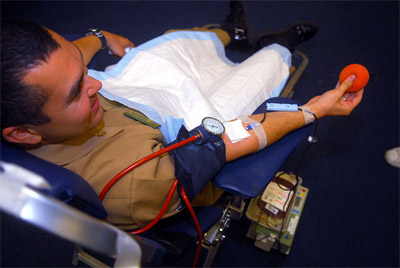Gift Incentives Increase Blood Donations

Gift Incentives Increase Blood Donations
A series of studies by University of Sydney Professor Robert Slonim debunks the long-held notion that offering economic incentives to blood donors is risky, finding that virtually all economic rewards have a positive effect on donations without compromising the safety of blood.
The findings have implications for the low-rate of blood donations globally.
The results, published in the journal Science today, have shown that decades of evidence supporting opposition by policymakers to economic incentives for donations of blood is outdated.
Institutions such as the World Health Organisation and national blood agencies have for 40 years promoted policy guidelines stating that blood should be collected from unpaid volunteers.
The research paper, 'Economic Rewards to Motivate Blood Donations", states that such long-standing opposition to compensating blood donors has been in part based on outdated evidence indicating economic incentives could reduce the number of donors and attract 'worse" donors.
'These studies typically suggested economic incentives can decrease people's altruistic motivations to donate, and may also attract donors who have greater risks such as viruses and infectious diseases," said Professor Slonim, from the School of Economics at the University.
'However, these findings are questionable as they did not examine actual incentives for actual blood donations, and often relied on study participants who were aware they were being observed by researchers.
'Our results clearly find that economic rewards have a positive effect on donations without negative consequences to the safety of the blood."
In the Science paper, Slonim and his co-authors Nicola Lacetera of the University of Toronto and Mario Macis of Johns Hopkins University cite their own extensive studies and those of others who have studied the behaviour of actual blood donors in the United States, Argentina, Switzerland and Italy.
One of their studies examined individual data from nearly 100,000 donors at 72 American Red Cross blood drives in northern Ohio from September 2009 through August 2010. Gift cards were offered at half of the blood-drive sites; no incentives were provided at the other sites, which served as controls.
They found that an advertised offer of a $5 gift card increased the likelihood of donating among people with a history of giving by 26 per cent; and a $10 gift card produced a 52 per cent rise. Moreover, the gift card offers caused others to donate, including people who previously had never given blood. The incentives also induced regular donors to switch from their usual donation sites to locations where rewards would be available.
'The risks of economic incentives producing an unsafe blood supply have diminished dramatically due to advances in screening technology and changes to the donation guidelines by WHO and many blood collection organisations," Professor Slonim said.
Slonim suggests incentives could be used to attract blood donations at times when blood supplies are particularly low. Although many individuals are eligible to donate blood, only a small percentage of eligible individuals, less than 10 percent, donate blood in the wealthiest countries, and even fewer donate in low-income countries.
The researchers warn that the evidence does not promote a cash-for-blood policy. The studies they analysed offered non-cash items.
Professor Slonim argues that economic incentives are not the only possible means to address blood shortages: 'As social scientists, we recognise there is a large gulf between a pure volunteer supply and a market-based system.
'Our work in Science demonstrates that even small gifts are a powerful tool to address shortages."
MORE
- Chiropractic Myths & Truths
- Gerard Fogarty Arthritis and Knee Replacement...
- Kym Ellery The ELLERY Eyewear Collection Interview
- Dr Ross Walker The Real Modern Killers Interview
- Shelly Horton Hay Fever Help Interview
- Sebastian VanVeenendaal Royal Rehab's Beach...
- Abigail Koch Family Private Health Insurance...
- Monique Cashion Organic Awareness Month Interview
- Dr Bill Harris Omega-3s Interview
- The Top Ten Health Myths Busted
- Professor Bolin IBD Management a Life-Long...
- Anthia Koullouros Best Cold and Flu Defence...
- Leprosy in NSW
- Julie-Anne Mitchell Go Red for Women Healthy...
- Insight into Chronic Disease Hospitalisations...
- Jeff Chan Mobile Phone Allergies Interview
- How to Conquer Bad Winter Health Habits
- Bad Cholesterol Behind Cancer Spreading In Body
- New Screening Test Recommended To Help Prevent...
- Support For The Rural Nurse Workforce A...
- Kathy Nielsen Ovarian Cancer Australia National...



